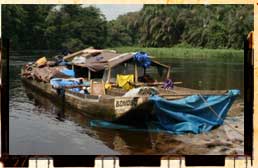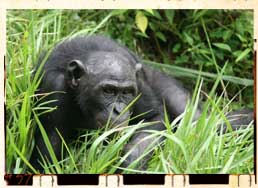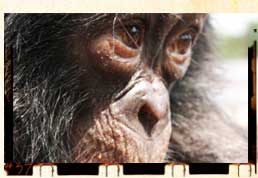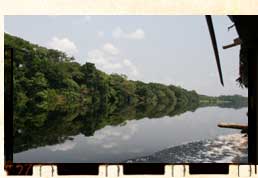11 November 2005 (almost forgot to remember it was Remembrance Day).
A graveyard of rusty skeletal barges greets you on approach, an equally murdered crane also. A few walls remain to indicate what was once a building, perhaps a church. Nevertheless, Basankuso is the last pretence of urban civilisation for the rest of the river and we are obliged to acknowledge it by registering. Its 6.30 in the morning, mist is lifting, people on the riverbank wear jackets against the cool. From nowhere, a multitude of children materialise to gawp at the white people. A small fleet of dugout pirogues are parked diagonally nearby and women and children are washing their clothes and themselves in the shallows. I can hear singing coming from beneath a nearby tree.
A pair of planks over a muddy oily ditch leads up to a dusty clearing that functions as a marketplace. Indifferent looking women sit behind benches selling the same things- soap, washing powder, sacks of charcoal, onions, tomatoes, green and red peppers, prepaid telephone cards. A few ducks waddle around. In a flash, the fickle children abandon the whiteys and rush to the marketplace because the local army reserve seems to be going through their paces. In groups of about 30 they sweep down from the forest behind the town, through the marketplace, into the barracks and then back again.
Some are wearing army boots, others gumboots. All wear khaki somewhere but otherwise it is a mix of fake English soccer league chic and whatever else is eyecatching at hand. One muscular chap was wearing a fetching purple crop top to go with his camouflage pants. Each group shuffles/marches/jogs/jives to their own chant and are reinforced by their own witchdoctors, bedecked in radiating reed headpieces and skirts. One woman in shorts and gumboots strikes her own blow for sexual equality, joining the procession and refusing to be chased away. It is more dance and display than discipline, with much laughter, and they are gone as quickly as they appeared.


Myself & Paul - (Photos by martin Bendeler)
It was only a matter of time before I had to dive into the river with a crocodile. We asked a boatman if he had any fish to sell and he was most pleased to offer us a live trussed-up crocodile for $5 (Arne, who was once curator for reptiles for the Copenhagen zoo had it pegged for a dwarf crocodile (osteolaemis tetraspis), a CITES listed endangered species. Paul wanted to buy it to free it.). So pleased, in fact, that he tried to dock with us and, in so doing, capsized his own boat. He stood aghast on our prow as his pirogue filled with water and immediately turned to us for compensation.
I had only just woken up and was lying in my boxers on my mattress, but seeing this man's livelihood sinking downstream, I just jumped in after it. As I got closer, I remembered his canoe had a little grumpy crocodile in it, but by then it was too late. At any rate, the croc had his own problems, being tied up in a rapidly sinking dugout
canoe. Anyway, I got to the canoe and kept it afloat, the boatman eventually joined me, we saved the croc and a basket of wriggly catfish, Charles reversed the boat and picked us up and all should have been well. But the boatman, adjusting his dripping ragged trousers around a waist that I could probably have encompassed completely with two fingers and was all sixpack and no stomach, complained bitterly that his hurricane lantern had gone down with the ship along with the rest of his very valuable catch and who was going to pay for it all. We bought his crocodile and his fish, shrugged our shoulders for the rest and sent him on his way. We then mugged for the cameras a little before releasing the critter in some reeds some distance upstream.










